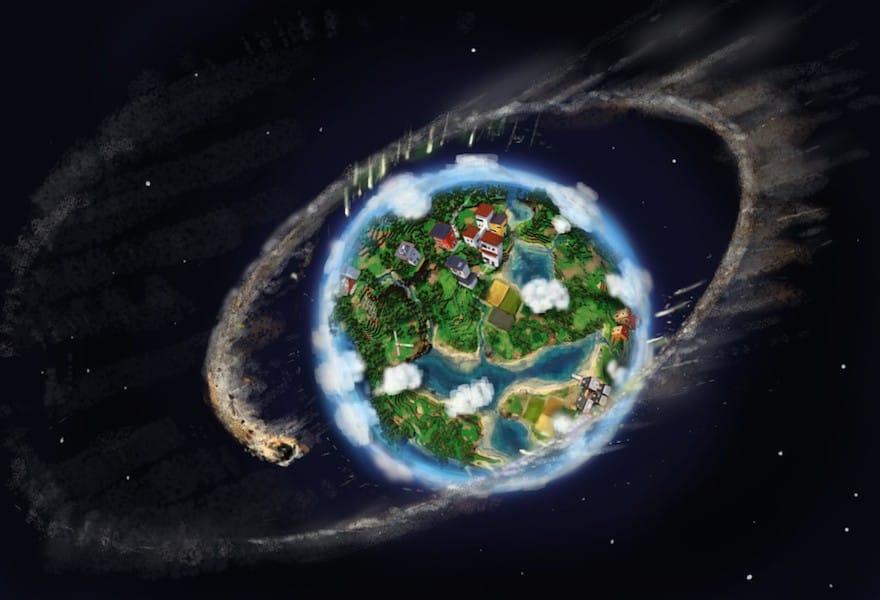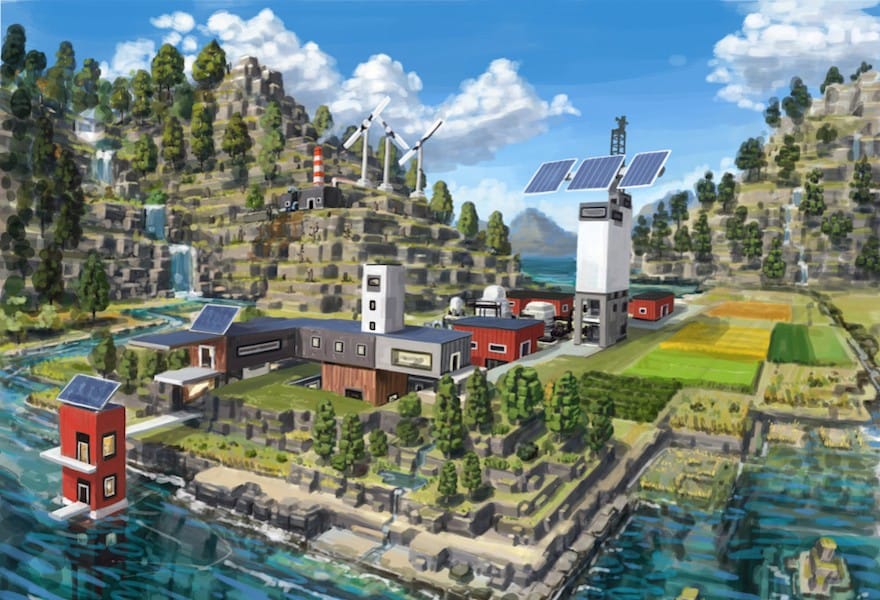Enough with the post-apocalypse. What about the pre-apocalypse?

A five-minute montage. A few quick flashbacks. The first chapter of a book. In most apocalyptic works, this is all the time that is given to those precious moments before the catastrophe. The meteor hits, the outbreak occurs, the bombs fall: now the real story can begin.
In a way, this focus on the post-apocalypse is an escape. The apocalypse has come, and the battle to save the world is over—now, life has become a purifying crucible, with survival it’s only goal.
But those overlooked moments before the end have a drama of their own. Do people come together to prevent the coming apocalypse, or do they crumble under the weight of an almost certain doom? For John Krajewski, founder of Strange Loop Games, this time when people are faced with solving an almost insurmountable challenge is the most valuable and overlooked part of the apocalyptic canon.
“Typically games give you this post-apocalyptic world where society has fallen apart, and you have to pick up the pieces and experience a story in that world, and that’s great,” he says. “But it’s another thing entirely to be part of that society that is on the edge of falling apart. Eco is that part.”

Eco, Krajewski’s latest game, is a multiplayer world simulator that he has come to classify as “pre-apocalyptic.”. In it, players are forced to come together to prevent certain destruction through collaborative technological progress. Each server in the game represents a doomed world; players are given a real-time month (or whatever time they decide upon) to prevent the apocalypse by gathering resources and building the necessary technology in a Minecraft-esque malleable landscape.
But here’s the catch: players must also balance ecological considerations such as animal population and resource scarcity, much as they would on Earth. To do so, laws can be enacted to ban certain harmful practices or set necessary guidelines—but only if players can agree upon the terms of the deal.
Previous games have attempted to simulate similar ideas—4X games, for example, often explore the high-wire balancing act of governance and resource scarcity—but not many have placed player cooperation at such a premium.
Krajewski sees Eco as part of the growing legacy of craft-heavy, multiplayer survival games such as Minecraft, Rust, and Terraria, where “world-scale dynamism,” as he calls it, is possible. He hopes Eco will build upon the genre by bringing social structures within this umbrella concept of world-dynamism.
“You have to collaborate and share specialized skills, you have to function in a really rich player economy that sells goods and services, contracts, and rents on property,” he says. “The world is malleable like in other voxel games, but so is the social structure, and I think that’s going to be the really amazing part.”
The government system is key to this concept of malleable social structures. Players will be presented with data that informs them of their planet’s fragile ecosystem, which they then have to interpret and use to inform laws—which are voted on by the players—to promote ecological balance. In this way, Krajewski believes that Eco requires and teaches a different kind of skillset than your average survival game.
“It takes real skill, and not the typical kinds of skills you need in games—it takes collaboration, political will, and governance,” says Krajewski.
Eco requires and teaches a different kind of skillset
Krajewski and his team were particularly influenced by works that detailed the complexities of this kind of human collaboration, and what happens to political structures in times of chaos. Jared Diamond’s Guns, Germs, and Steel and his later book Collapse, along with Cormac McCarthy’s The Road, are three of the main works Strange Loop Games have drawn from in designing Eco’s government and ecological systems.
Diamond’s renowned non-fiction works look closely at the interconnectedness of resources and social structures, and how outside environmental forces like disease and disaster have dramatically affected the course of human history. The Road, on the other hand, takes a much more intimate look at the effects of societal collapse on human relationships and the human psyche. Like in Eco, The Road explores what happens when humanity fails to balance its natural resources—which, for Krajewski, is the frightening possibility that partly inspired Eco’s creation.
“I’ve heard The Road called the best piece of environmental media ever, and I agree,” he says. “You get put into this heart-wrenching world that is just so believable, and it puts in your head just how close we are to the abyss, and lets you feel the infinite value and fragility of the world around you. That destruction is an absolute gift to the viewer, and I want the same to be true of Eco.”
“you feel the infinite value and fragility of the world around you”
That global vulnerability is key, and next to the focus on social collaboration, is what separates Eco from games that have come before it. Resource scarcity has been a mechanic in plenty of games, but global destruction is rarely a consequence to consider. Of course, in reality, it is. We are, in fact, living through a historic time of ecological death, as the sixth extinction—caused primarily by humans—wreaks havoc on a global scale.
And while it is primarily other organisms that have been affected by climate change so far, scientists expect that humans, given there is no miraculous solution, will eventually reap similar consequences.
Krajewski and his team are well aware of Eco’s place in these contemporary crises, and hope that the game can provide a sort of education on just how delicate our planet’s ecosystem is. They recently secured $900,000 in grant money from the Department of Education to help distribute the game to classrooms around the country—but they are careful not to call the game educational.
“We want to break down that wall between educational games and regular games,” says Krajewski. “I don’t think there should be any distinction there.”

Krajewski points to a game like Civilization, which is steeped in historical and sociological lessons, as an example of a game that is educational but is rarely thought of as such. The educational genre, he says, often carries negative connotations because the game aspects so often play second fiddle to the lessons being drilled. Instead, Krajewski sees Eco as a game that kids can play for fun at home or at school, with the ecological and governance lessons woven naturally into the gameplay and supplemented by teachers who can follow the progress of their students’ world.
The complexity of the game’s morality also separates it from traditional “educational” games, as it forces players to make the kind of uncertain decisions world leaders have to make on a daily basis. Technology, for example, is always necessary to stop the coming apocalypse, but what kind of environmental price comes with rapid progress?
The social governance system also forces players to confront real-world complexities. Krajewski points to the example of a dictator forcing people to come together to prevent the cataclysm: is that morally permissible? Luckily, as Krajewski says, “Eco provides not just complexity, but the tools to understand it, and the tools to make decisions about it as a group.” Detailed graphs and statistics are given to players to make sure collaboration is not only possible, but effective.
Krajewski sees Eco as ultimately having an optimistic outlook
In that sense, Krajewski sees Eco as ultimately having an optimistic outlook on humanity’s ability to work together in times of crisis.
“[The game] is saying a lot of things, but one of the most important ones is ‘we’re facing some incredible problems as a human race that could result in our collective end, but we have the ability to overcome them,’” says Krajewski. “It puts players into a world where their collective darkest nightmares are looming, but can be conquered.”
As the effects of climate change continue to appear before us, and with nuclear annihilation always a disturbing possibility, it’s not much of stretch to say we’re already living in Eco’s pre-apocalypse. Perhaps that’s why pop culture has focused so much on the time after the apocalypse has already come: our current pre-apocalyptic reality is too complex, too frightening to confront. These post-apocalyptic works represent a certain resignation, perhaps even a Freudian desire for destruction. But Eco, despite all its complexities, still believes.



